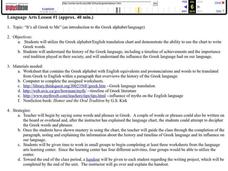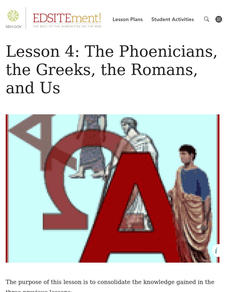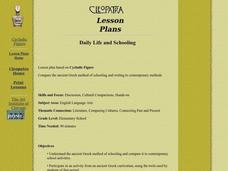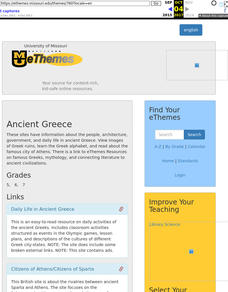National Endowment for the Humanities
The Greek Alphabet: More Familiar Than You Think!
In this Greek alphabet lesson, pupils explore the Phoenician origins to the Greek alphabet. Learners compare Greek letters to current letters and write a paragraph about the life of students in ancient Greece. They also identify Greece...
Curated OER
It's All Greek to Me
Introduce your class to the Greek alphabet and language. Examine how the Greek language influenced the English language. Study the history, timeline of achievements, and the role oral history played in Greece.
Curated OER
The Greek Alphabet
Tenth graders examine the history and origins of the Greek alphabet. They take notes while listening to a teacher-led lecture, and read and interpret common Greek words on the board. Students then create a decorated name plate with...
National Endowment for the Humanities
Lesson 4: The Phoenicians, the Greeks, the Romans, and Us
Learners review knowledge gained in the three-part unit on the history of the alphabet. Using maps and images, learners consolidate their understanding of ancient Greece, the Romans and the Phoenicians, and their respective impacts on...
Curated OER
Daily Life and Schooling
Learners compare the ancient Greek method of schooling and writing to contemporary methods and learn the Greek alphabet on wax tablets.
Curated OER
International Festival: Greece
Young scholars celebrate the culture of Greece. In this multicultural lesson, students participate in several activities which examine the culture of Greece. Young scholars study the Greek alphabet, identify the country on a world map,...
Curated OER
The Alphabet is Historic
Students describe how the Phoenicians, Greeks and Romans passed down the alphabet through the generations. They compare and contrast the letters from early alphabets to the one of today and discuss how they are different. Using a map,...
Curated OER
Ancient Refuge in the Holy Land - International Phonetic Alphabet
Students research the uses and symbols of the International Phonetic Alphabet. They complete a worksheet to translate and transcribe phrases of English into the International Phonetic Alphabet.
Newspaper in Education
The Iliad: A Young Reader Adventure
Is The Iliad part of your curriculum? Check out a resource that offers something for those new to teaching the classic and those with lots of experience using Homer's epic. Plot summaries, discussion questions, activities abound in this...
Curated OER
Science Hits Activity
Students listen to a song that teaches the elements of the periodic table and write their own song to be used as an aid in remembering scientific information.
Curated OER
Ancient Greece
This is a great resource for finding websites on ancient Greece. Explore various websites to investigate life in ancient Greece. Young historians will view images of Greek ruins, take a virtual tour of the Parthenon, view an online...
Curated OER
Hieroglyphics: It's Not Greek To Me! (It's Egyptian)
Students identify different hieroglyphic characters. They spell their name and write a sentence using them. They use online hieroglyphic translators as well.
Curated OER
Where Do Words Come From?
Students examine the foreign-language roots of various English words. Using the dictionary's word derivation notes and abbreviation key, they develop a list of words with a foreign-language origin, and create a class dictionary.
Curated OER
Getting the Best out of Book Buddies
Students explore the best approaches to reading with book buddies (younger students). Students create a student-friendly definition for "mentor" and identify traits of a success that a mentor displays. They examine literature for...















